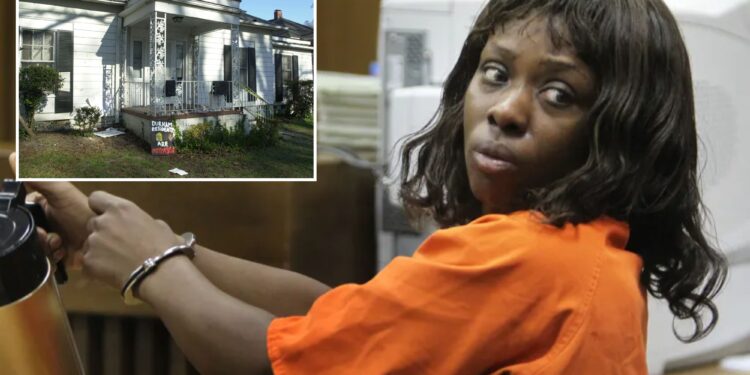
Former stripper and convicted murderer Crystal Mangum admitted Thursday that she lied and “made up a story” that three Duke University lacrosse players raped her at a team party in 2006.
“They trusted me that I wouldn’t betray their trust, and I testified falsely against them by saying that they raped me when they didn’t, and that was wrong,” Magnum told the independent media outlet “Let’s Talk With Kat” at the North Carolina Correctional Institution for Women.
“[I] made up a story that wasn’t true.”
Mangum, 46, said she made up the allegation because she “wanted validation from people and not from God.”
The exotic dancer, who is in prison for the second-degree murder of her boyfriend in 2013, asked former players David Evans, Collin Finnerty, and Reade Seligmann for forgiveness.
“I hope that they can forgive me,” she said, referring to the men as her “brothers” in the biblical sense. “I want them to know that I love them, and they didn’t deserve that, and I hope that they can forgive me.”
Mangum had never publicly stated that she fabricated the rape allegation before Thursday’s revelation.
She can no longer be prosecuted for lying under oath since the statute of limitations on perjury charges under North Carolina law is two years.
Mangum’s shocking admission comes nearly two decades after she accused the lacrosse players of raping her while she was performing at a team party in March 2006.
Evans, Finnerty, and Seligmann were arrested following the allegations.
The case garnered national attention and the tension was fueled when former Durham County district attorney Mike Nifong said in a March 2006 interview with CBS News that “there’s no doubt a sexual assault took place” and that the assault was “racially motivated.”
“The circumstances of the rape indicated a deep racial motivation for some of the things that were done. It makes a crime that is by its nature one of the most offensive and invasive even more so,” said Nifong, who served as the lead prosecutor in the case.
Nifong initially said that DNA would prove the players’ innocence, but he reversed his statement when the tests returned negative.
Former Duke University President Richard Brodhead also took action against the team following the accusations.
Brodhead accepted then-head men’s lacrosse coach Mike Pressler’s resignation, canceled the remainder of the season, and suspended the three players from school after they were indicted for rape — despite asking the public not to prejudge the criminal case, NPR reported in 2007.
The three players were ultimately all found innocent of the crimes and the charges were dismissed in April 2007
Former NC Attorney General Roy Cooper did not prosecute Mangum for perjury after the case was dismissed due to concerns over her mental health.
The North Carolina State Bar disbarred Nifong in June 2007 for lying in court and withholding DNA evidence that would have helped absolve the defendants.
Brodhead’s response to the matter came under scrutiny after the rape allegations were dropped and a statement he provided soon after.
“The fact is that we did not get it right, causing the families to feel abandoned when they most needed support,” he wrote in a 2007 statement. “This was a mistake. I take responsibility for it, and I apologize.”
Evans, Finnerty, and Seligmann sued Brodhead and the University after their case was dismissed and settled for an undisclosed amount.
They alleged that Brodhead repeatedly made false statements and conspired to deprive them of their right to a fair trial.
Evans graduated in 2006, while Seligmann transferred to Brown University and Finnerty to Loyola University Maryland.
Mangum was indicted of first-degree murder and two counts of larceny in March 2011 and is currently serving a 14 to 18-year prison sentence.
She was also convicted on misdemeanor charges after setting a fire that nearly torched her home with her three children inside a year before killing her boyfriend.
Vincent Clark, a friend who co-authored Mangum’s self-published memoir, told ESPN in 2011 that he hopes people don’t rush to judgment, as the public did in the Duke Lacrosse case, noting she realizes her mental health problems.
“I’m sad for her. I hope people realize how difficult it is being her,” Clark said.
With Post wires



























